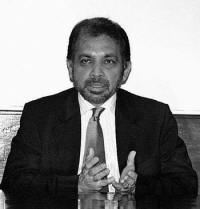
Suggestions, demands, options... Is it time for talks again?
Face 2 face by Dinesh Weerawansa
[email protected]
|

Dr. Palitha Kohona |
|

C. Chandra Nehru MP |
There are fresh hopes for peace talks as Norwegian Ambassador Hans
Brattskar meets LTTE Chief negotiator S. P. Thamilselvan in Killinochchi
tomorrow. We spoke to the Head of the Government's Peace Secretariat,
Dr. Palitha Kohona, who is also the Foreign Secretary and the Tamil
National Alliance Parliamentarian for Ampara District, C. Chandra Nehru.
Q: The Government has been expressing its desire to resume
peace talks at any time. Finally the LTTE has responded to it. Isn't
that a positive sign?
P.K.: We have had no response for peace talks from the LTTE.
There has been no formal response, other than a report in a newspaper. I
don't think the Government should respond to a report in a newspaper.
Neither the SLMM nor Norway has indicated anything to that effect.
C.C.: The LTTE is ready to talk on peace. They always wanted
to find a negotiated settlement. Unfortunately, they were forced to
fight. The Government want to go for peace talks only to retain
international opinion in their favour and get advantage.
Q: Why do you think the LTTE decided to go back to the
negotiating table at this juncture?
P.K.: As I said earlier, the LTTE has not done so. We have
always expressed our desire to go back to the negotiating table. But as
far as I know, the LTTE has not shown any interest in going back to
peace talks. We won't respond to websites and newspapers. There are
recognised channels. But so far, there has been no formal communication.
C.C.: Not only at this juncture, the LTTE has always expressed
its willingness to go back to the negotiating table. They do not want to
fight if they could find a reasonable solution to Tamils in the North
and East though a dialogue.
Q: The LTTE has always made use of peace talks to regroup,
strengthen and re-position. Especially when they suffer military
setbacks, they have a tendency of doing so.
P.K.: Of course, in the past they have always done so to
regroup and strengthen themselves. They used various cessations of
hostilities as well as negotiation periods for that purpose. Such
history of the LTTE is well known and open for debate. Now, they have to
come out and prove their genuine interest, seriousness and commitment
for peace.
C.C.: That is only the view of the Government. They have been
doing so and accusing the LTTE so show that the Government is stronger.
This is not the time to show who is strong and weak. Whoever is willing
for a lasting peace is strong enough for national development.
Q: The Government has categorically stated that the LTTE would
continue to be treated as a terrorist organisation and would be dealt
with accordingly. Will this have any impact on upcoming peace talks?
P.K.: There are no upcoming peace talks. As I said very
clearly, there is no response whatsoever from the LTTE. As long as the
LTTE negotiate with a commitment, we will negotiate with them. But if
they undertake any action that would harm Sri Lanka's national security,
we will have to take appropriate action.
C.C.: Yes. Unless the Government differentiates terrorism from
the reasons for the agitations of the Tamils and stop 'state terrorism',
there won't be any peace. The Government has to stop its actions against
the LTTE while the negotiations are going on.
Q: Most major political parties are of the view that terrorism
and peace talks are two different subjects. Do you think that terrorism
should be suppressed while we go for a negotiated settlement for the
problem in the North?
P.K.: We will continue to keep faith on a negotiated solution.
His Excellency the President has said that over and over.
C.C.: We too believe that peace and terrorism cannot go hand
in hand. They cannot go together. There is no need to prepare for any
war if there are sincere peace negotiations taking place.
Q: Do you think both parties should go back to the negotiating
table without any preconditions that may harm the smooth progress?
P.K.: That is too a theoretical question. Why talk on those
matters even before we go to the negotiating table. What is important is
that we go to the negotiating table with the view of achieving an
honourable peace.
C.C.: It was done earlier on many occasions. But what
happened? The negotiations were hampered. If this is done with
sincerity, we could achieve results. If the Government comes out
genuinely to solve the ethnic conflict, we could achieve position
results at the negotiating table.
Q: What contributions could the All Party Representative
Committee (APRC) make towards the success of future peace talks and find
a lasting solution to the problem?
P.K.: The great position is that it would address and remains
committed to concerns of minorities through the APRC - especially the
Tamil minority. We hope that the proposals that the APRC would be
putting forward will help in the devolution of power within united Sri
Lanka.
C.C.: All parties involved at the APRC should understand
genuine problems faced by the Tamil community. They should also accept
the fact that the rights of Tamils were deprived. All parties involved
should make their own proposals without any communal enmity.
Q: What is the fate of the Ceasefire Agreement (CFA)? Is the
CFA, which has been violated on numerous occasions, going to help any
future peace talks?
P.K.: Any future peace talks will not be based on the
Ceasefire Agreement. These will only be based on the objective of
achieving an honourable and a sustainable peace. That is our stand.
C.C.: Yes. On many occasions by the Government as the Forces
don't understand the importance of the Ceasefire Agreement signed in
2002. They should understand the consequences that all of us will have
to face each time they break the CFA.
Q: What proposals have your party made or planning to make as
a solution to the problem?
P.K.: We understand that these proposals are at a very mature
stage. You have to understand that this is a political process. It would
take time. There are many political parties interested in this process.
Hence, it is important that we give adequate and reasonable time for
those political parties to come out with their proposals.
C.C.: Our party has found a solution 50 years ago. The federal
system was proposed by our late leader S. J. V. Chelvanayagam nearly
five decades ago. But the Government rejected it at that time. Now, the
present Government is concentrating on that to find a solution to the
conflict.
Q: What type of a development plan is needed for the North and
the East thereafter?
P.K.: The Government's development plan is already in motion.
The Government has implemented several development programs in the North
and East. An accelerated development plan is ready. The development plan
has not lagged behind, waiting for a final solution.
C.C.: The North and East will have to be amalgamated first.
The problems faced by the Tamils and Tamil-speaking Muslims have to be
recognised and answered urgently. Then, the Government must go ahead
with planned development projects. If there is no peace, there won't be
any development. |
